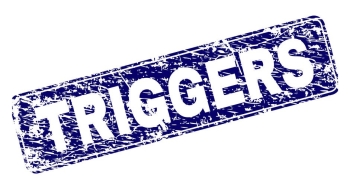
What is a “trigger?”
A trigger is anything that causes your PTSD symptoms to occur. Triggers are detected by your senses (sight, sound, touch, taste and smell). A trigger may involve only one sense or it may involve many of your senses. Triggers can remind you directly or indirectly of some aspect of the trauma. A trigger will cause you to react physically and/or emotionally.
Why should I know my triggers?
Knowing what your triggers are will NOT make your responses to them go away. However, knowing what your triggers are can help you in several ways. First, knowing your triggers may help you be more prepared for your response to the trigger. The trigger and your subsequent reaction will not come as a surprise. Being able to decrease the element of surprise in your reactions will likely help you feel more in control of your PTSD like symptoms. You will also be more likely to give yourself permission to feel whatever response you experience in reaction to the trigger. This will enable you to stop fighting your responses, be more forgiving of yourself, and focus on the management of your symptoms.
Secondly, knowing your triggers will also help you set limits to your exposure to certain triggers. Unfortunately no one can ever completely control how and when they are exposed to PTSD triggers. However, being able to exert some control over exposure to triggers may make you feel more empowered and more confident in your abilities to manage your symptoms. While it is not advisable in the long run to avoid certain people, places or things that trigger your PTSD like symptoms, in the short run it is healthy and wise to set boundaries to people, places or things you know will trigger PTSD symptoms. As you feel more confident in the management of your PTSD symptoms or as your symptoms begin to decrease, you can test and push your boundaries around the people, places or things that trigger PTSD symptoms. It may always feel scary to push your boundaries around people, places or things you know will likely trigger PTSD like symptoms. However, if you approach this task having already experienced success and confidence in your ability to understand and manage your PTSD like symptoms, will you be much more prepared to deal with whatever reaction you might experience.
Another important reason to know your PTSD triggers is because knowing your triggers will often help you identify certain patterns in your reactions to these triggers. Perhaps you react more physically to some triggers, and more emotionally to others. Perhaps you are more bothered by certain triggers at a certain time of the day. You may also being to realize a specific thought pattern you have when experiencing PTSD like symptoms. Understanding the patterns in your PTSD triggers will help you better manage your PTSD like symptoms. These patterns also provide clues to parts of the trauma you are struggling with and may need to work on with a therapist.
Knowing your PTSD triggers one way to begin the recovery process. There are many important reasons to know what your PTSD triggers are. Knowing your PTSD triggers will make them less frightening. You will be more forgiving of your own reactions and will be more prepared to manage your PTSD like symptoms. You will likely feel more confident and successful in managing these difficult symptoms. Below are two examples, Bob and Anna. Both are recovering from a traumatic experience and benefited from knowing their triggers. It may be helpful to use a “PTSD Trigger Table” to uncover the patterns in your triggers and reactions.
Examples: Bob & Anna
Bob, a police officer, was recently shot at during a domestic violence call. After tracking his triggers and his responses to these triggers, Bob realizes he often feels sick and anxious [response to the trigger] when he is called to domestic violence situations [the trigger]. Unfortunately Bob cannot avoid these calls, as he must attend to them for his job. However, since he understands he will likely feel sick and anxious he gives himself permission to feel that way which makes the PTSD like symptoms not seem as frightening. He is able to realistically approach the situation instead of catastrophizing the situation. His anxiety and feelings of nausea are not shocking and do not seem unpredictable to him anymore. This helps him feel more in control of his PTSD like symptoms. Bob is able to stop fighting his response and focus on the management of his symptoms.
Anna, an ER nurse, was recently raped while walking home from the subway to her apartment after work. The rapist began to harass her and frighten her just before attacking. Anna tracks her triggers and her reactions and she realizes that since the rape she has been reacting strongly to harassment by construction workers [the trigger] who she passes while walking to work. While their catcalling used to annoy her, since her rape Anna experiences rage and an overwhelming rush of adrenaline [response to the trigger]. It often takes her several hours to feel calm and Anna knows this is impacting her ability to perform at work. Anna’s strong reaction to the harassment no longer surprises her and she is able to accept her reactions to the situation. Anna is able to then focus on the management of her symptoms. In Anna’s case, Anna decides to walk a different route to the subway to avoid the catcalling. This choice has made her feel more empowered and more successful in managing her PTSD like reactions.






















